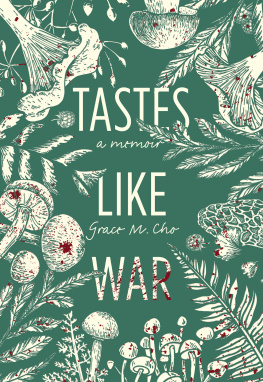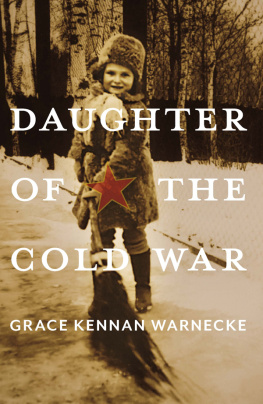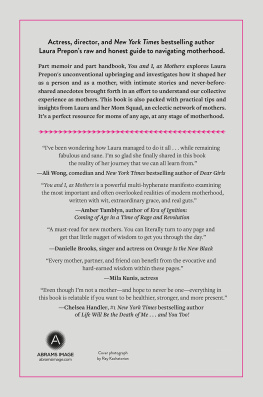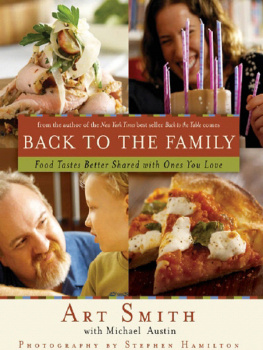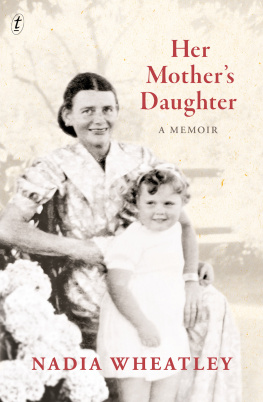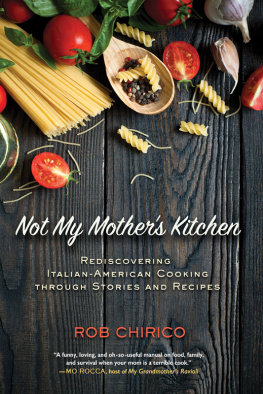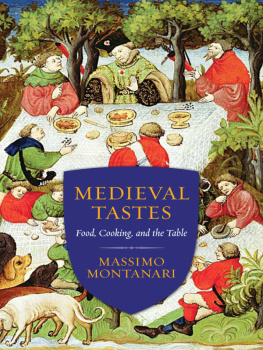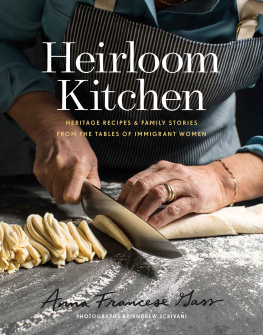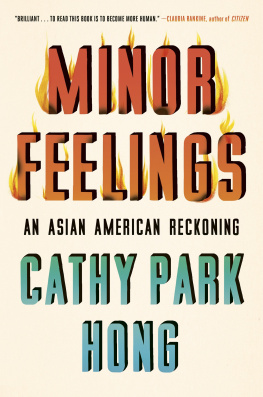Contents
Page List
Guide
PRAISE FOR TASTES LIKE WAR
As a member of the complicated postwar Korean diaspora in the US, I have been waiting for this book all my life. Tastes Like War is, among other things, a series of revelations of intergenerational trauma in its many guises and forms, often inextricable from love and obligation. Food is a complicated but life-affirming thread throughout the memoir, a deep part of Grace and her mothers parallel journeys to live with autonomy, dignity, nourishment, memory, and love.
SUN YUNG SHIN, author of Unbearable Splendor
What are the ingredients for madness? Grace M. Chos sui generis memoir of her mothers schizophrenia plumbs the effects of colonialism, war, and violence on a Korean American family. Her moving and frank exploration examines how the social gets under our skin across vast stretches of space and time, illuminating mental illness as a social problem as much as a biological disease.
DAVID L. ENG, coauthor of Racial Melancholia, Racial Dissociation: On the Social and Psychic Lives of Asian Americans
Raw, reaching, and propulsive, Grace M. Chos Tastes Like War creates and explores an epic conversation about heritage and history, intergenerational trauma, and the connective potential of food to explore a mothers fractured past. This is both a memoir and a reclamation.
ALLIE ROWBOTTOM, author of Jell-O Girls: A Family History
Tastes Like War is a requiem and a love song for a brilliant, elusive mother whose traumatic past shadows her daughters present. This searingly honest, heartbreaking memoir evokes the ways in which food in the immigrant household may just as easily be a path to assimilation, alienation, and forgetting as it can be to remembering, connection, joy, and possibility.
GAYATRI GOPINATH, author of Unruly Visions: The Aesthetic Practices of Queer Diaspora
Exquisitely crafted, Tastes Like War will break readers hearts as it engages them in a daughters search for her mother in the traumatic effects of war, immigration, and mental illness. Cho brilliantly shows the possibilities of the genre to bring together thought and affect in the pursuit of understanding the ghosts of our historical present.
PATRICIA TICINETO CLOUGH, author of The User Unconscious: On Affect, Media, and Measure
Grace M. Chos debut memoir follows and forages alongside her mother in the shadowed gendered histories of the unending Korean War in the United States. This is a book of care and homage to the persistent creativity of a Korean mother, her daughters love, and their resilience despite the ghosts of US militarism. Tastes Like War signals a powerfully evocative new voice.
JENNIFER KWON DOBBS, author of Interrogation Room
In excavating the origins of her mothers schizophrenia, Grace M. Cho untangles not only her own family history but that of a generation of survivors and their descendants marked by war. Her exploration leads readers on a poignant journey across time and space, revealing the scars on the human psyche wrought by the legacy of violence underpinning US-Korea relations. A moving tribute to all those never meant to survive, Tastes Like War suggests that healing cant always be achieved through solitary effort but requires a collective reckoning with the past.
DEANN BORSHAY LIEM, director of First Person Plural
Published in 2021 by the Feminist Press
at the City University of New York
The Graduate Center
365 Fifth Avenue, Suite 5406
New York, NY 10016
feministpress.org
First Feminist Press edition 2021
Copyright 2021 by Grace M. Cho
All rights reserved.
Some names and identifying details have been changed to protect the privacy of individuals.
| This book is supported in part by an award from the National Endowment for the Arts. |
| This book was made possible thanks to a grant from New York State Council on the Arts with the support of Governor Andrew M. Cuomo and the New York State Legislature. |
| This book was published with financial support from the Jerome Foundation. |
No part of this book may be reproduced, used, or stored in any information retrieval system or transmitted in any form or by any means, electronic, mechanical, photocopying, recording, or otherwise, without prior written permission from the Feminist Press at the City University of New York, except in the case of brief quotations embodied in critical articles and reviews.
First printing May 2021
Cover design by Suki Boynton
Text design by Frances Ross
Library of Congress Cataloging-in-Publication Data
Names: Cho, Grace M., author.
Title: Tastes like war : a memoir / Grace M. Cho.
Description: First Feminist Press edition. | New York, NY : The Feminist Press at the City University of New York, 2021. | Includes bibliographical references.
Identifiers: LCCN 2020051100 (print) | LCCN 2020051101 (ebook) | ISBN 9781952177941 (paperback) | ISBN 9781952177958 (ebook)
Subjects: LCSH: Cho, Grace M. | Cho, Grace M.--Family. | Korean American women--Biography. | Children of the mentally ill--United States--Biography. | Food habits--Korea (South) | Cooking, Korean. | Korea (South)--Social life and customs.
Classification: LCC E184.K6 C4733 2021 (print) | LCC E184.K6 (ebook) | DDC 305.48/89519073--dc23
LC record available at https://lccn.loc.gov/2020051100
LC ebook record available at https://lccn.loc.gov/2020051101
PRINTED IN THE UNITED STATES OF AMERICA
CONTENTS
For all of my mothers, each of whom fed me in her own way, and for everyone whose voices have gone unheard.
PROLOGUE
Chehalis, Washington, 1976
I AM FIVE YEARS OLD, walking down Main Street with my family. The usually sleepy downtown is a riot of balloons and streamers; a marching band thunders past. Its Americas two hundredth birthday, says an old lady with short curls as she hands me a red-white-and-blue popsicle. Funny to have a birthday party for a country, I think, yet I am far too young to consider what it means to be patriotic, or American, or Asian in America. Im ignorant of the raging wars in Southeast Asia, the stalemated war in Korea, or the ways in which Asian migrations are intimately intertwined with American imperialism and the grossly misnamed Cold War that slaughtered seven million innocents in the name of anti/communism.
I think only about the icy-sweet chemical flavor on my tongue, the sticky syrup dripping down my fingers. With my clean hand, I hold on to my father as we push our way through the revelersmy father, a fifty-seven-year-old white Anglo-Saxon farmer turned merchant marine, born and raised in Chehalis, who married my mother, the foreign girl, the China Doll, the war bride, the lovely lotus he saved from third world Korea.
Her waist-length black hair betrays her effort to style herself like a Western woman in a halter top, shorts, and platform sandals. Her sun-kissed skin is noticeably brown against the backdrop of an all-white crowd. My mother stands out because shes the Oriental.

